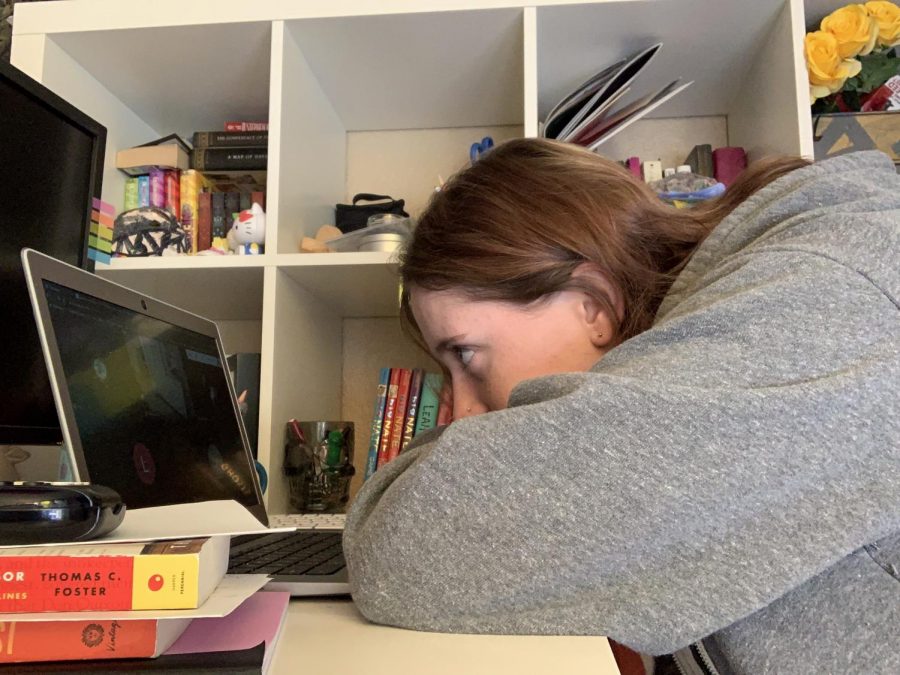Senioritis
The Secondary Plague of 2020
Senior Erin Fuller stares into the blank reflection of her Chromebook, contemplating life and the deep grips of senioritis.
November 6, 2020
Senioritis is the biggest illness that occurs within students of the senior class. The effects are astronomical, the symptoms are practically incurable, and in this day and age of the COVID-19 pandemic, students are getting worse.
Okay, okay, this is off to a pretty dramatic start. But that doesn’t mean it’s not true.
Senioritis is an actual mentality that many students experience. After learning and stressing and crying at the dinner table with your dad trying to figure out 5th grade multiplication (we’ve all been there), the last year of school seems like a pretty tempting time to begin to relax. Especially since online school is beginning to be the norm of education, it’s easier to slack off. With college applications being sent, reviewed, and accepted, kids are “without an external motivator (reward of college admission or threat of college denial)” (New York Times).
Broomfield has around 330 seniors. In a survey conducted of the students, there were a variety of replies. The seniors were asked how online learning and the new school schedule has affected their motivation and if they think hybrid schooling will be easier or harder.
Molly York, member of the marching band, and Cade Williams both agree that their online motivation is doing well.
“School being online actually helped my motivation because I had more time to do work and I got more sleep,” York said. “There was so much less stress than there would have been in person.”
“I really built this year up in my mind as a celebration of everything that came before it,” Williams said. “It really comes down to how you frame it in your head — it’s amazing the difference that can make.”
There are many benefits to learning online. According to the University of Illinois, Springfield, strengths include the advantage of learning anywhere, education being student centered, and easy access to resources.
The new schedule for the year is a two quarter setup with four periods per quarter…and the quarter counts as a semester, speeding up the curriculum. Emily Grove thinks the schedule is doing her good.
[The new schedule makes senioritis] less prominent, honestly,” Grove said. “I only have to focus on a few classes at a time with the quarter schedule, so I can really hone in on each class and get my work done.”
Emily Stenger enjoys the hybrid option. Students can go in person one day a week and experience a sense of normalcy…with a mask.
“It was so nice to go into school and actually see people for once,” Stenger said. “I got to really see the personalities of the people around me, and I wasn’t stuck in my room on my computer with slow WiFi all day.”
Senioritis, like all mentalities, is different for everyone. Although some students are thriving in this technical environment, 29.2% of 106 seniors said their motivation is tanking.
Emma Goldberg, caption on varsity poms and editor-in-chief of the yearbook, is having a tough time finding motivation on top of everything else going on in her life.
“I have work and practice soon after my school day is over, and there were definitely some times where I had no motivation to go to my last class of the day,” Goldberg said. “I would ask my dad to call me off just so I could take a nap before leaving for work or practice.”
Grace Admire, member of Mock Trial and German Honor Society, isn’t a big fan of the school schedule.
“I think [senioritis is] definitely more prominent, because it’s so easy to just say ‘nah’ and take a nap in my bed instead of doing work,” Admire said. “Plus with things being due at the end of the week, I can procrastinate more than ever before.”
Some researchers see online school as more harmful than helpful. The John Hopkins News-Letter sees that students are “struggling to create an environment free of distractions and develop the necessary organizational skills to stay on top of their assignments, noting that these difficulties can affect students’ mental health”.
Jaden Solano sees flaws in the hybrid schooling option.
“I’m choosing to stay home until we go back to school full time,” Solano said. “Many other schools have gone back to full time online after outbreaks of the virus so I don’t think it’s the right time yet.”
So what’s the solution? COVID-19 is getting worse in the US, so online school may be the only option for a while. How can students bring their motivation back up? Here’s some things that may help:
- pursue a passion, prepare yourself for what you might want to study in college
- practice cooking, cleaning, things that are essential for living on your own
- try a phone cleanse for a week
(New York Times)
Keep going seniors; only 6 months left!






